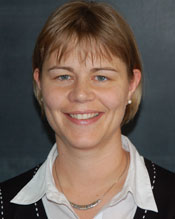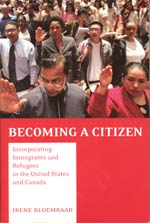UC Berkeley Press Release
A world on the move
Sociologist seeks
to raise the profile of migration studies at Berkeley,
where a new generation of students from immigrant
families is coming of age
BERKELEY — For their respective doctoral research projects, Juan Herrera, in Ethnic Studies, is analyzing the experiences of Hispanic immigrant day laborers in Oakland; Sang Lee, in Environmental Science, Policy, & Management, has interviewed more than a hundred Nicaraguan coffee pickers in Costa Rica; and sociologist Kimberly Hoang has shadowed Ho Chi Minh City sex workers in the bars where they meet up with local men, Vietnamese expatriates, and backpackers from the developed world.
Three students. Three fields of expertise. Just a few of the Berkeley scholars studying a world on the move.
|
To appreciate the current scale of human migration — and why scholars across disciplines are drawn to study its implications — consider that the foreign born represent more than one in four residents of California, one in eight nationwide.
"Human history has always been about migration," notes Assistant Professor of Sociology Irene Bloemraad, "but with ever-increasing globalization, the 21st century will be a century of people on the move. Researchers need to understand this process to harness the opportunities migration brings, as well as deal with the challenges."
Bloemraad, an expert in the field of immigration, came to Berkeley in 2003, the same year she completed her doctorate at Harvard. She has been working since to raise the profile of immigration studies on campus — whose growing role is supported by new faculty scholars such as Bloemraad and Cybelle Fox in sociology, Leti Volpp in law, Sarah Song in political science and law, and Taeku Lee in political science.
|
Born in Spain to Dutch parents, Bloemraad emigrated to Canada with her family at four, lived in France for a year at 18, and came to the U.S. at 24 to do her doctorate. Her academic interests grew from this steady diet of cultural shocks. An outsider looking in, as she puts it, is struck by social peculiarities "at an experiential level. You can only understand why something's strange if you have something to compare it to."
For her PhD research, Bloemraad analyzed government records and conducted extensive interviews on both sides of the U.S.-Canadian border, comparing immigrants' acquisition of citizenship and their participation in politics and civic affairs in the two countries. The resulting book, Becoming a Citizen, argues that Canadian governmental policies lay a better groundwork for immigrants' efforts to gain citizenship, vote in elections, run for office, and participate in civic affairs. The book was released in 2006, the same year that Congressional proposals on immigration sparked protests by hundreds of thousands of immigrants across the U.S.
Nurturing the next generation of researchers
For scholars of immigration and related aspects of globalization, Berkeley's huge cohort of first- and second-generations students is a source of excitement. Two thirds of Berkeley students are either born in another country or have at least one foreign-born parent. Bloemraad says that students in her capstone course for undergraduate sociology majors are required to interview someone about their migration experience. Prohibited from choosing their parents, many students end up having this conversation with a grandparent, aunt, or uncle — and find it "extremely eye-opening," Bloemraad says, because they don't always know their family's story.
'There's a next generation of researchers able to do things that
my generation cannot do.... There's a growing cohort of such
students
— and it's thrilling!' — Barrie Thorne, chair Gender & Women's Studies |
Fellow sociologist Barrie Thorne, chair of Gender and Women's Studies, speaks with enthusiasm of student researchers uniquely motivated and equipped to conduct cross-cultural research. She has mentored Kimberly Hoang, whose parents left Vietnam as refugees in 1979, in her work on globalization's effects on the Vietnamese sex industry, and cites the sociology grad student as one of "the next generation of researchers — able to do things that my generation cannot do, because she comes from an immigrant family herself, has transnational experiences, moves comfortably in Vietnamese as well as U.S. culture, is bilingual in Vietnamese and English. There's a growing cohort of such students — and it's thrilling!" says Thorne.
To capitalize on the campus's potential as a rich site for migration studies, Bloemraad has actively sought, in her five years at Berkeley, to foster scholarly exchange and help students create community. Her motives for seeking to strengthen this academic field are partly selfish, she admits. "When I got here five years ago," she recalls, "very few people at Berkeley were doing immigration as a main issue."
Earlier this month, more than 40 graduate students met for what has become a new campus tradition — the third-annual day-long "Spotlight on Immigration" symposium, to showcase and discuss their research findings. In 2003, Bloemraad also initiated the Interdisciplinary Immigration Workshop, at which grad students meet biweekly to discuss their dissertation research from diverse academic perspectives.
For Ming Hsu Chen — a student in the law school's Jurisprudence & Social Policy program who is analyzing the impact of U.S. civil-rights policy on recent immigrants — the workshop has proven to be "one of the most valuable dimensions of my experience at Berkeley." At workshop sessions she's gotten valuable feedback (from student peers as well as Bloemraad, whose comments she calls "incisive yet encouraging — a model for what constructive feedback should be"), and a preview of what she calls "mysterious phases" of graduate education.
"The first time I saw a grant application, or a chapter of a dissertation… was probably in the workshop," Chen says. She's also joined two spin-off dissertation-support groups and taps into a resource-rich website and an active email listserv for campus immigration scholars.
 Cal
Day talk on immigration Cal
Day talk on immigration With examples from political cartoons and media punditry, Irene Bloemraad will discuss "Aliens, Immigrants, and Citizens: Fact and Fiction of Immigration in the U.S.," on Saturday, April 12, 12:30-1:30 p.m., in 402 Barrows Hall. The talk is free and open to the public. |
Ongoing research
Serving, with Chen, on a hiring committee associated with the Berkeley Diversity Research Initiative, Bloemraad has helped to interview potential additions to the Berkeley's cohort of immigration scholars. A mother of two young children, she has also been conducting research among Mexican immigrants in Richmond and Oakland, to learn whether and how parents and children share knowledge of the American political system.Starting this spring, with collaborator Christine Trost of the campus's Institute for the Study of Social Change, Bloemraad is leading related research in the Chinese and Vietnamese immigrant communities. The plan calls for six students fluent in Mandarin, Cantonese, and Vietnamese to interview Bay Area immigrants. As before, Bloemraad plans to hire undergraduates as well as graduate students for the project, which is funded by a grant from the Russell Sage Foundation.
"I wasn't sure what contribution undergrads would bring," Bloemraad admits thinking, the first time she took on students through the Undergraduate Research Apprentice Program. Yet undergrads from immigrant families — bringing bilingual fluency and strong connections in the communities being studied — made a "real contribution" to the research, Bloemraad found. "They are incredibly effective in recruiting families and helping to translate interviews and other materials."
Chen says there are "more and more places" on campus for scholars at all levels to do migration scholarship — through projects led, in many cases, by untenured or recently tenured young scholars. New mentors and sites for research, combined with the urgency of immigration issues "pressing on the university," make this, she feels, "an exciting time and place to be an immigration scholar."



